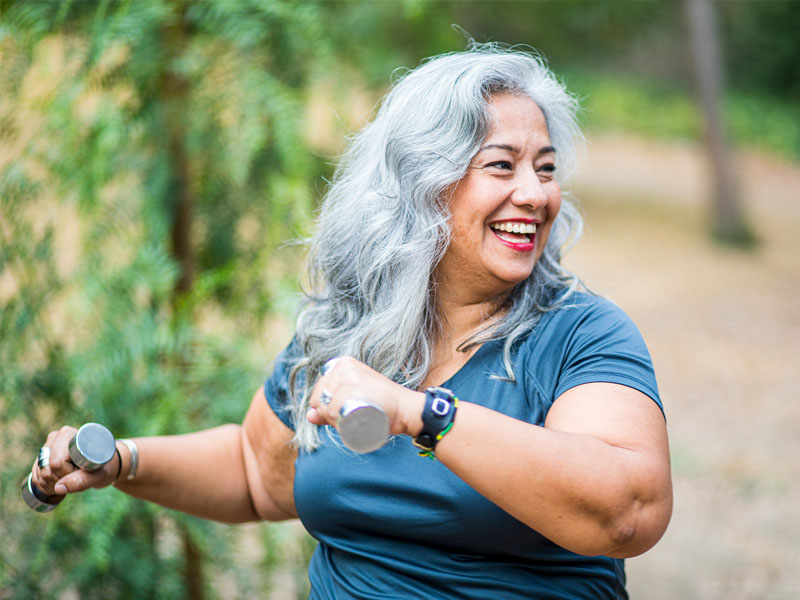More Topics
◀ Home
Preventive care: Get screened for osteoporosis
According to the Centers for Disease Control and Prevention (CDC), osteoporosis is a health condition where bones become weak and are more likely to break. It’s sometimes called a silent disease because those who get osteoporosis may not notice any symptoms or even know they have the disease until they have a bone density test or break a bone. Osteoporosis can happen at any age, but the risk of osteoporosis increases after age 50. Learn more about risk factors and what you can do to strengthen your bones and prevent osteoporosis.

Get screened to know your risk
The best way to know if you are at risk for osteoporosis is to get a bone density test, called a dual-energy X-ray absorptiometry (DEXA) scan. Your risk of breaking a bone is higher if your bone density or T-score, which compares your bone density to what is expected in a healthy adult of your gender, is low. If your T-score is -2.5 or lower, you might have osteoporosis.
A DEXA scan can help you and your provider:
- Find out if you have osteoporosis
- Predict your chance of breaking a bone in the future
- Check your risk for further fractures if you have broken a bone
- See if your bone density is getting better
- Make sure an osteoporosis medication is working
Who should have a bone density test?
The Bone Health and Osteoporosis Foundation recommends you have a bone density test if:
- You are a woman age 65 or older
- You are a man age 70 or older
- You break a bone after age 50
- You are a woman of menopausal age with risk factors
- You are a postmenopausal woman older than 65 who has risk factors
- You are a man age 50-69 with risk factors
Common risk factors
You are at a higher risk for osteoporosis if you are:
- Older in age
- A woman
- A woman who has reached menopause
- Have a family history of broken bones or osteoporosis
- Small and thin
Health conditions that may cause bone loss
Talk with your doctor about your medical history, as some conditions may increase your risk of getting osteoporosis.
Here are some conditions that may increase your risk:
- Autoimmune disorders, such as rheumatoid arthritis, lupus and Multiple Sclerosis
- Endocrine disorders, such as diabetes, thyroid disorders and low testosterone
- Digestive disorders, such as celiac disease, inflammatory bowel disease and weight-loss surgery
- Hematologic disorders like sickle-cell disease
- Neurologic disorders, such as stroke, multiple sclerosis or Parkinson’s disease
How you can lower bone loss
There are some steps you can take to protect your bones and reduce your risk of bone loss, which include getting the right nutrients, exercising and more.
Eat well-balanced meals
The Academy of Nutrition and Dietetics recommends eating foods that include bone-building nutrients like calcium and vitamin D to help improve and maintain bone health.
Calcium-rich foods and drinks include:
- Milk
- Yogurt
- Cheese
- Calcium-fortified soy milk
- Soybeans
- Dark green leafy vegetables
- Calcium-fortified tofu
- Canned salmon or sardines (with soft bones)
Vitamin D is also important, as it helps our bones absorb calcium. Your body can absorb vitamin D through sun exposure (make sure to wear sunscreen), food and supplements. Try to get most of your vitamin D intake by eating foods like salmon, tuna, mackerel, egg yolks, mushrooms grown under UV light, and fortified foods and beverages.
It’s best to get most of your nutrients by eating whole foods. But if you can’t get enough calcium or vitamin D through foods, talk your doctor to see if taking a calcium or vitamin D supplement is right for you.
Other ways to strengthen your bones
Here are some more ways to keep your bones healthy:
- Do weight-bearing and muscle-strengthening exercises
- Stop smoking
- Don’t drink alcohol or limit how much you do drink
- Take a prescribed osteoporosis medication, if needed
Talk to your doctor
Talk to your provider about bone health at your next visit to see if you need to get a bone density screening. If you are at risk and need to get screened for osteoporosis, you and your provider can work together to create a personal care plan to prevent further bone loss.
Written by: Blue Cross of Idaho
Posted: September 14, 2022
Updated: July 9, 2024
